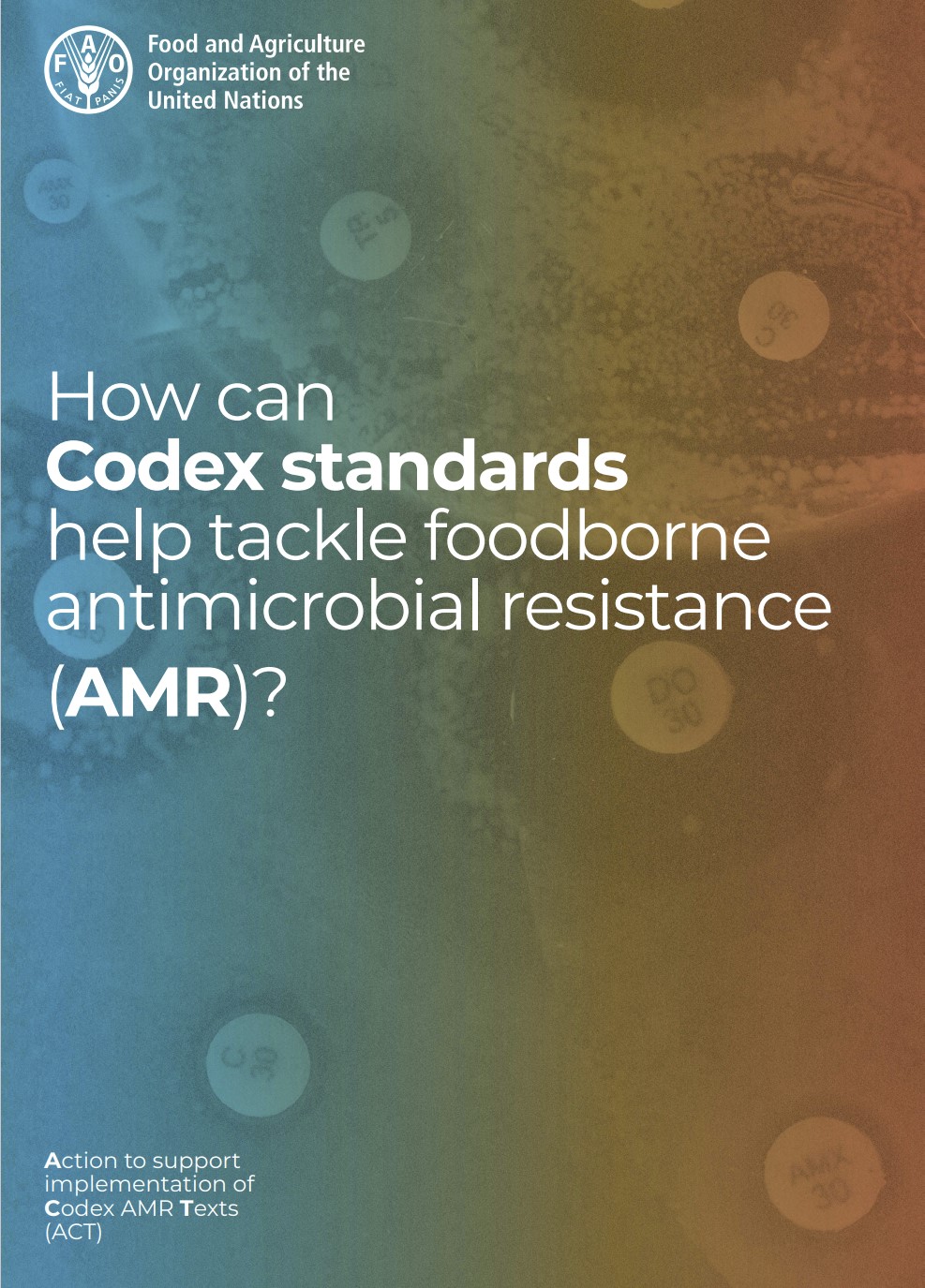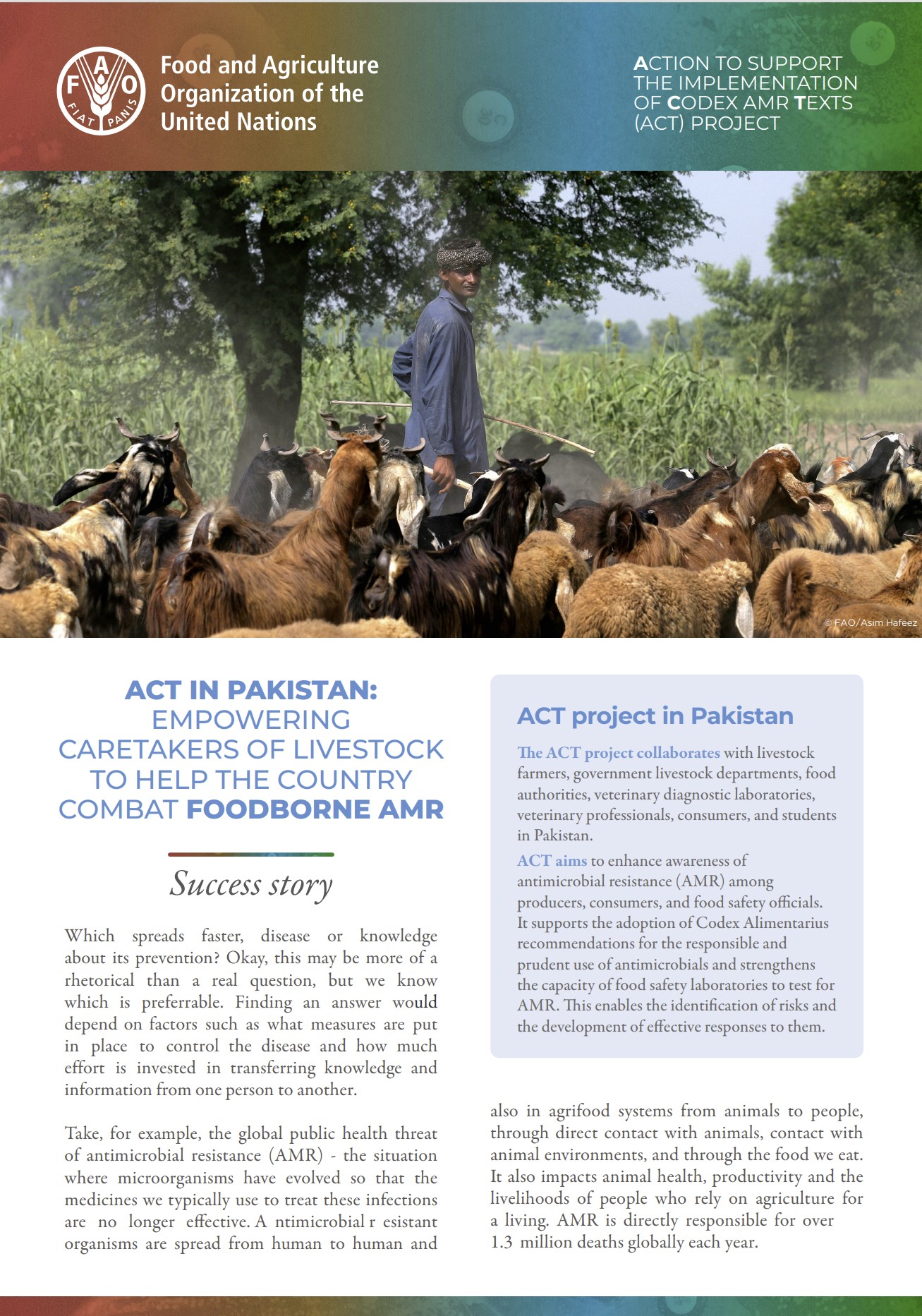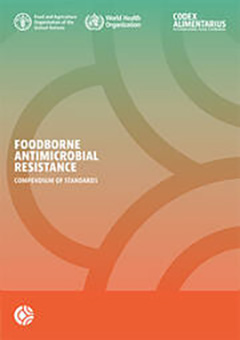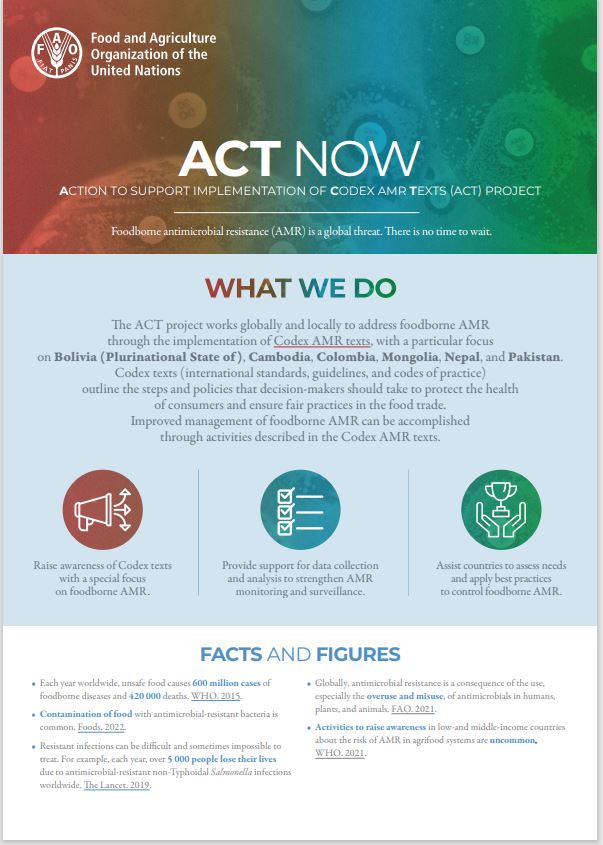 مقاومة مضادات الميكروبات
مقاومة مضادات الميكروبات
تعتبر مقاومة مضادات الميكروبات خطراً عالمياً داهماً متزايداً يحدق بصحة البشر والحيوانات. كما أن لها تداعيات على كل من سلامة الأغذية والأمن الغذائي والرفاه الاقتصادي للملايين من أسر المزارعين.
تؤدي الأغذية دوراً هاماً في تطور مقاومة مضادات الميكروبات وانتشارها. وإن وجود الكائنات الدقيقة المقاومة لمضادات الميكروبات في نظم الإنتاج الزراعي وفي السلاسل الغذائية، يشكل مساراً ممكناً لتعرض الجميع للإصابة. وتعتبر ممارسات النظافة الجيدة في الزراعة، وهي من العوامل الأساسية لتحقيق سلامة الأغذية، بالغة الأهمية هي أيضاً في التصدي لمقاومة مضادات الميكروبات.

دور الدستور الغذائي في مقاومة مضادات الميكروبات
تشكل الكائنات الدقيقة (من بكتيريا وطفيليات وفيروسات وفطريات) في الأغذية مخاطر محتملة تهدد سلامة الأغذية. أما العلاقة بين استخدام مضادات الميكروبات (وهي عوامل قادرة على الفتك بالكائنات الدقيقة أو منعها من النمو) في الحيوانات المنتجة للأغذية، ونشوء الكائنات الدقيقة المقاومة في السلسلة الغذائية، فمصدر قلق وقد كانت موضع العديد من المشاورات الوطنية والدولية.
إن مدى استخدام العوامل المضادة للميكروبات في الحيوانات المنتجة للأغذية (بما يشمل تربية الأحياء المائية) أو في البستنة أو لدى البشر، يساهم في وجود الكائنات الدقيقة المقاومة لمضادات الميكروبات في البشر، وهو يتفاوت بين مختلف الكائنات الدقيقة ومختلف الأقاليم.
حين يتناول البشر كائنات دقيقة مقاومة لمضادات الميكروبات في الأغذية، فإن بعض أنواع تلك الكائنات الدقيقة قد يسبب الأمراض. وقد تكون تلك الأنواع فضلاً عن غيرها من الأنواع مصدراً لمحددات المقاومة القابلة للانتقال من كائنات دقيقة أخرى، بما في ذلك الممرضات البشرية.
واعترافاً من الدستور الغذائي بالحاجة إلى استجابة أعمّ ومتعددة التخصصات من أجل التعامل مع مقاومة مضادات الميكروبات، أنشأ في عام 2006 أول فريق مهام معني بمقاومة مضادات الميكروبات من أجل صياغة إرشادات قائمة على العلوم حول كيفية تقييم وإدارة المخاطر التي تهدد الصحة البشرية والتي ترتبط بوجود كائنات دقيقة مقاومة لمضادات الميكروبات في الأغذية والأعلاف (بما فيها تربية الأحياء المائية) وانتقالها عبر الغذاء والأعلاف. أما فريق المهام الثاني الذي تأسس حديثاً استجابة لتزايد الاهتمام العالمي بالخطر الداهم الذي تطرحه مقاومة مضادات الميكروبات على الصحة العامة، فسوف يضع إرشادات ذات أساس علمي لتمكين إدارة متسقة لمقاومة مضادات الميكروبات على امتداد السلسلة الغذائية.
كما أن هناك نصوصاً أخرى للدستور الغذائي بشأن العقاقير البيطرية ومخلفاتها ونظافة الأغذية وعلف الحيوان تساهم أيضاً في التصدي لمقاومة مضادات الميكروبات، عبر منع تطور تلك المقاومة وتخفيف انتشارها على امتداد السلسلة الغذائية.
النصوص ذات الصلة بالدستور الغذائي
أخبار

ACT project: Building networks is critical to achieving project goals

ACT project / Jorge Pinto Ferreira, FAO, describes how six countries evaluated their implementation of Codex AMR Texts

ACT project / Pakistan brings together 50 experts to discuss progress on AMR

ACT project part of One Health approach to combat antimicrobial resistance in foodborne pathogens

AMR Codex Texts (ACT) project welcomes national coordinators in Bolivia, Cambodia, Colombia and Nepal

AMR Codex Texts (ACT) project in Bolivia and Colombia / coverage on national TV as workshops evaluate progress
وقائع رئيسية
- هناك حوالي 500.000 حالة وفاة بشرية كل عام على علاقة بمقاومة مضادات الميكروبات
- تستخدم 27 فئة مختلفة لمضادات الميكروبات لدى الحيوانات.
- إن القيمة الإجمالية لسوق الصحة الحيوانية في عام 2011 قد بلغت 22 مليار دولار أمريكي (منظمة التعاون والتنمية في الميدان الاقتصادي)
- هناك 42 بلداً فقط يملك نظاماً لجمع البيانات حول استخدام مضادات الميكروبات في الثروة الحيوانية (المنظمة العالمية لصحة الحيوان)
- لا توجد بيانات موحدة متاحة بشأن الاستخدام العالمي لمضادات الميكروبات في مجال الثروة الحيوانية
Source FAO
فيديو
ACT Video 2023
Available also in French, Spanish, Korean, Cambodian, Nepalese, Mongolian and Bolivian.
New ACT factsheets
- Bolivia (Plurinational State of) in ACTion
- Cambodia in ACTion
- Colombia in ACTion
- Mongolia in ACTion
- Nepal in ACTion
- Pakistan in ACTion

Available in: English, Spanish and Mongolian.

Available in: English.

Available in: English.

Available in: English.





